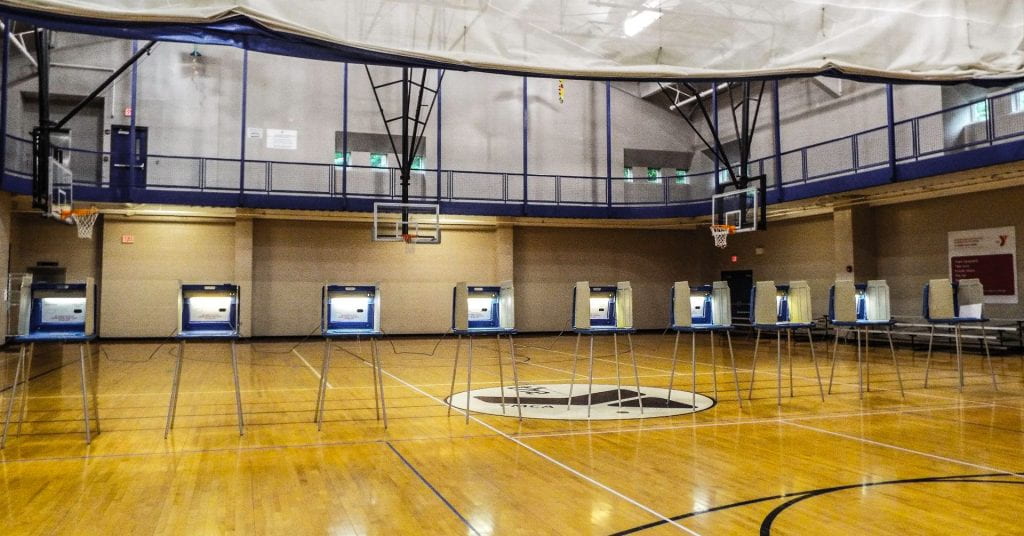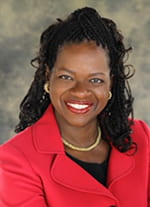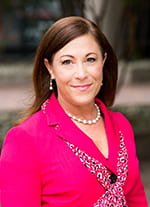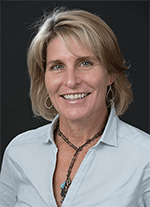Two recent events hosted by the Center for Social Development (CSD) illuminated restrictions on ballot access and strategies to increase voting. The two convenings were webinars within CSD’s Empowering Voting and Democracy. Both featured national experts on voting rights.
“As the United States prepares for the 2022 midterm elections, voting rights are threatened,” Gena McClendon, series organizer, told participants in the March 30 event “Voting Rights: What’s It All About?” McClendon, Director of Community Engagement at CSD and of the Center’s Voter Access and Engagement initiative, added, “Voting is the bedrock of democracy, and every citizen who chooses to vote should be able to cast a ballot.”
The March 30 event featured Barbara Arnwine, president and founder of the Transformative Justice Coalition, Elizabeth Hira, Spitzer Fellow and senior counsel of the Brennan Center for Justice, and CSD Faculty Director Denise Lieberman, director and general counsel of the Missouri Voter Protection Coalition.
McClendon moderated the discussion with assistance from Jennifer Slavik Lohman, director of the St. Louis Area Voter Protection Coalition, and Vicki C. Washington, founder of the St. Louis Area Voting Initiative.
Social work has a long history of promoting democracy, and this work continues. “Connecting Voting and Social Work,” the April 13 convening, featured Tanya Rhodes Smith, director of the Nancy A. Humphreys Institute for Political Social Work in the University of Connecticut School of Social Work and a leader in the national Voting Is Social Work campaign.
Countering Efforts to Limit Ballot Access
Speakers in both events described restrictive measures advancing in courts and statehouses, as well as federal voting legislation and efforts to block those proposals. They also identified strategies for protecting voting rights and opportunities for citizens to join in the work.
“We are in the middle of one of America’s most important times of controversy and change,” said Arnwine. “We are dealing with a profound threat to our democracy and profound threat to the right to vote for millions of Americans.”
Rhodes Smith echoed Arnwine’s comments. “Across the country, we’re seeing this rollback of rights, and it is appalling,” she said. In it, she sees calculated efforts to reinforce a “manufactured myth, this intentional myth that your vote doesn’t make a difference.”
“I hear this all the time,” she continued. “‘My vote doesn’t matter.’ ‘The system is rigged.’ ‘The election was rigged.’ ‘It makes no difference who votes.’ ‘Everything stays the same.’” Those narratives and restrictive measures, Rhodes Smith said, “work hand-in-hand to suppress voter turnout.”
Other efforts are playing out in state houses, Hira told participants. “Legislatures in at least 27 states have introduced, prefiled, or carried over 250 bills with restrictive provisions on voting,” she said, citing research from the Brennan Center for Justice. “People of color are especially impacted negatively by these voting restrictions,” she noted.
Make no bones about it, said Lieberman, this is about race.
“Make no bones about it,” said Lieberman, “this is about race.” Efforts to restrict voting “are designed to and intended to target voters of color, in particular African American voters, young voters, low-income voters, our seniors, our voters with disabilities,” she said.
In North Carolina, Hira said, “research was actually done in the state legislature to figure out when minority voters voted most often and what methods they use, and then to specifically ban those types of voting.”
Arwine noted the trend to restrict voting by mail. “The majority of states that have adopted voter suppression laws have gone after this ability to vote by mail,” she said. “That’s what we saw in Texas, where it’s estimated that somewhere upwards of 23,000 plus people were denied the right to vote.”
Lieberman highlighted several restrictive trends in Missouri: “We are seeing a spate of these bills right here in Missouri that attack the citizen initiative process, would enshrine strict photo ID requirements to vote, undermine voting by mail, and ultimately undermine our elections.”
Arnwine and Hira emphasized the impact of measures that block voting by people with felony convictions or make it difficult for them to cast ballots. “Some 9,000,000 plus people who have served time, are off papers completely – no probation, no parole – don’t vote,” said Arnwine. “They’re afraid that if they do register to vote that they’re going to be locked up,” she continued. “They don’t know what their rights are.”
Arnwine hailed a recent court ruling that struck down North Carolina’s felony voting law. The ruling, she said, “will restore the vote to over 55,000 people.” She added, “The minute people walk out of prison, they have the right to vote.”
Both Arnwine and Lieberman denounced state attempts to control local election boards. Citing proposals in Georgia and Arizona, Arnwine condemned such “election subversion” moves as plots “to take over local boards of election, to make sure that they’re determining how votes are counted.”
The attempts are “an effort to delegitimize the democratic process itself,” Lieberman said. “We are seeing that play out in a spate of bills that would strip the authority of election officials to do their jobs. And we’re seeing this across the nation in threats against our local election officials.”
According to a study by the Brennan Center, one in six election officials have been threatened because of their job and nearly one in five have perceived on-the-job threats to their lives.
Several speakers mentioned structural barriers at polling sites. On Election Day, Arnwine said, “you watch people drive by and leave because they see long lines and they realize there’s no way they can wait.”
Hira noted research showing “that voters of color still experience longer wait times in line.” She added, “If you have fewer White voters at a polling place, you’re likely to see a greater likelihood of having to wait longer.”
Similar findings emerged from CSD’s study of polling sites in the St. Louis region. Researchers with the Center’s Voter Access and Engagement initiative found that line counts were longer at polling sites in Black communities. They also found evidence that sites in Black communities had fewer election judges and more accessibility concerns.
Strategies for Broadening Access and Engagement
All four speakers identified policy proposals they said would counter attempts to block or limit ballot access. Rhodes Smith discussed efforts to change felony voting laws, adopt same-day voter registration, broaden early voting, and increase voting by mail.
Hira described proposed legislation she helped to write. “Everything you hear that’s bad, that the media wants you to be upset about, there is an antidote and an answer that is teed up in the United States Congress to fix it,” said Hira, referring to the John Lewis Voting Rights Act and the For the People Act. These bills “will solve these problems,” she said, calling them “opportunities to fundamentally transform our democracy.”
Hira wrote portions of the For the People Act with colleagues while serving as a staff attorney for the Committee on Administration in the U.S. House of Representatives. She described the bill as “a federal floor, a national baseline.” She said, “Just like we decided that every state needs to integrate schools, this bill was said every state needs to give voters a basic minimum access to their voting rights, and you all do what you want to beyond that.”
Arnwine also emphasized the bill’s importance. “I want people to really understand the reason why this legislation was so powerful,” she said. “This was meant to impose mandatory uniformity across the states, so that the same laws that applied in Maryland would apply in Missouri, would apply in California.”
Citing the Senate’s failure to pass the bills, Arnwine said, “The question for all of us now is what happens in the 2022 elections with the Senate. So there’s much work to be done.”
Resources and Ways to Get Involved
Both events featured discussions on ways for participants to get involved, and both identified tools to facilitate work on voting rights issues.
Rhodes Smith introduced Voting Is Social Work’s new Power of Three campaign, a drive for practicing social workers, students, and faculty to engage at least three people and register them to vote. “Imagine if all 700,000 plus social workers engaged three voters,” she said. “It’s something simple that that people can do, especially if you are just getting started into this work.”
She also discussed Voting Is Social Work’s online resources and its partnership with Vote-ER. She encouraged participants to serve as poll workers or observers and noted that several states offer continuing education credit to social workers who work at polling sites on Election Day.
Arnwine directed readers to Vote Smart, a tool “providing information about current officials, candidates, issues, legislation.” She also discussed informational materials available through the Voting Rights Alliance and the Transformative Justice Coalition’s Voting Rights Institute, a weekly gathering to educate participants “about the fight for the right to vote, but also how to organize in these times.”
Hira shared a Brennan Center analysis of the For the People Act and a fact sheet on voter suppression’s effects in communities of color.
Lieberman invited participants to join the Missouri Voter Protection Coalition, shared information on the nonpartisan Election Protection coalition and referred participants to the League of Women Voters for information on elections and candidates.
“In it for justice”
In concluding remarks, Arnwine offered encouragement. “This is a fight,” she said, “and you’re in it for justice.”
“We are living in an era when the promise of democracy is at issue, and it’s a threat,” Arnwine told participants. “But I want people to know that, fortunately, there are a lot of us who won’t stop.”
Videos from both events are available from the Center for Social Development’s YouTube channel. Information on the series and individual events can be accessed on the Empowering Voting and Democracy series homepage.
“Voting Rights: What’s It All About?” was sponsored by the Center for Social Development; the Transformative Justice Coalition; the Brennan Center for Justice; Alpha Kappa Alpha Sorority, Inc., Gamma Omega Chapter; the Missouri Voter Protection Coalition; In Every Generation; the League of Women Voters of Metro St. Louis; the Grand Challenges for Social Work; the St. Louis Area Voting Initiative; and the St. Louis Area Voter Protection Coalition.
“Connecting Voting and Social Work” was sponsored by the Center for Social Development; Voting Is Social Work; Alpha Kappa Alpha Sorority, Inc., Gamma Omega Chapter; In Every Generation; the League of Women Voters of Metro St. Louis; the Grand Challenges for Social Work; the St. Louis Area Voting Initiative; the St. Louis Area Voter Protection Coalition; the Congressional Research Institute for Social Work and Policy; and the National Association of Social Workers.
Events in This Series
Voting Rights: What’s It All About?
March 30, 2022
Barbara Arnwine, Transformative Justice Coalition
Elizabeth Hira, Brennan Center for Justice
Denise Lieberman, Missouri Voter Protection Coalition
Moderator: Gena Gunn McClendon, Center for Social Development
Social Work Day on the Hill/Student Advocacy Day
March 9 & 10, 2022
The Center for Social Development cosponsored the 2022 Social Work Day on the Hill events, which were organized by the Congressional Research Institute for Social Work and Policy.
Connecting Voting and Social Work
April 13, 2022
Tanya Rhodes Smith, Nancy A. Humphreys Institute for Political Social Work, University of Connecticut; Voting Is Social Work
Moderator: Gena Gunn McClendon, Center for Social Development
Voting, Misinformation, Disinformation, and Manipulation
September 7, 2022
Shireen Mitchell, Media Manipulation
Jennifer Lohman, St. Louis Area Voter Protection Coalition
Moderator: Gena Gunn McClendon, Center for Social Development
Voting Is Social Work: Researchers Speak Out
September 13, 2022
The Center for Social Development is a cosponsor of this event, which is part of the series The Power of Macro Social Work: Forging Pathways, to be hosted by the Open Classroom at the Brown School at Washington University, in collaboration with Influencing Social Policy.
Mimi Abramovitz, Silberman School of Social Work at Hunter College
Cheryl Aguilar, Hope Center for Wellness
Gena Gunn McClendon, Center for Social Development
Shannon Lane, Yeshiva University
Gary Parker, Clark-Fox Policy Institute
Jenna Powers, University of Connecticut School of Social Work
Adelaide Sandler, Marist College
Moderator: Jason Ostrander, Sacred Heart University
Voting in Missouri, Civic Education, and Engagement: Local Voting, Community Action, and Impact
September 28, 2022
Louis Damani Jones, Gephardt Institute for Civic and Community Engagement
Gena McClendon, Center for Social Development
Eric Frey, St. Louis County Board of Election Commissioners
D. Benjamin Borgmeyer, St. Louis Board of Election Commissioners





